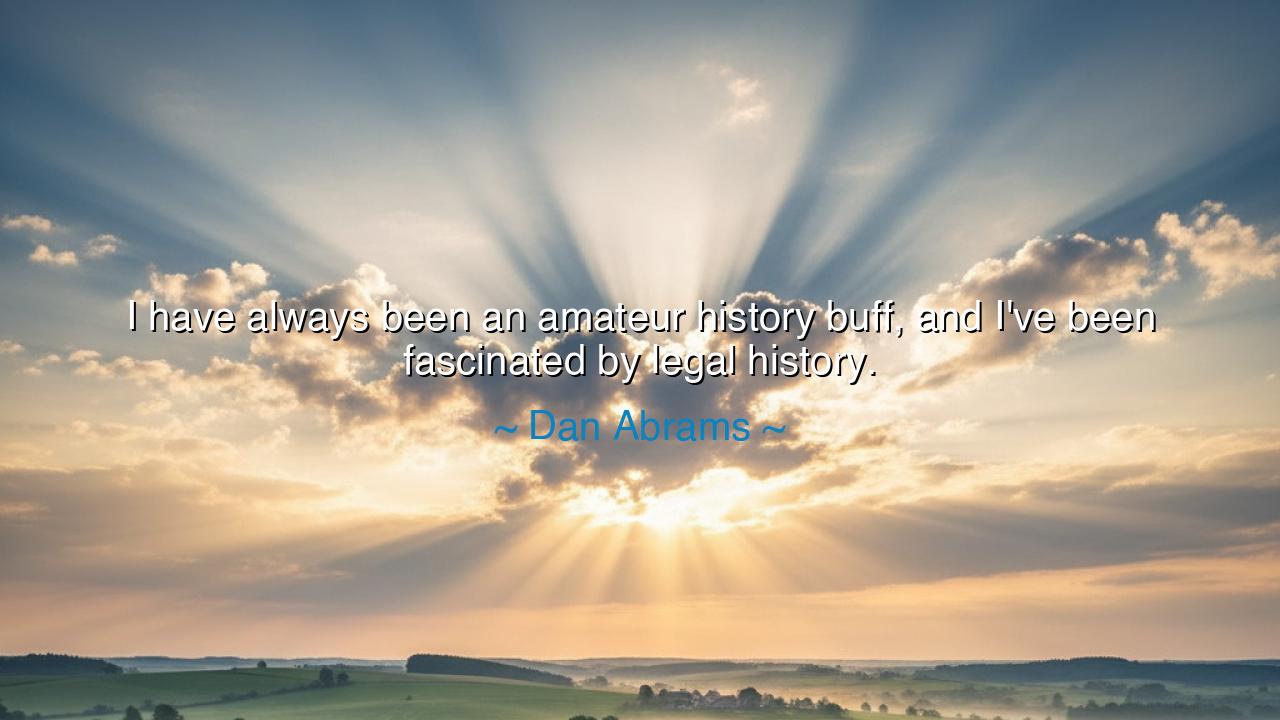
I have always been an amateur history buff, and I've been






“I have always been an amateur history buff, and I’ve been fascinated by legal history.” Thus spoke Dan Abrams, a scholar of justice and a teller of truth in our modern age—a man whose life has been devoted to unveiling the laws that have shaped humanity’s journey through time. In this humble confession lies not merely curiosity, but reverence. To call oneself an “amateur” in such matters is not to diminish one’s interest—it is to exalt it. For the love of history and the study of law are not only pursuits of intellect but acts of devotion to the story of civilization itself. Abrams’s words remind us that within the records of justice, within the parchment and precedent of law, lies the heartbeat of mankind’s struggle to define right and wrong, freedom and order, mercy and duty.
Dan Abrams, known widely as a journalist, legal commentator, and historian, has spent much of his career interpreting the law for the people—translating the arcane language of courts and constitutions into the living pulse of moral understanding. His fascination with legal history springs from the recognition that every trial, every verdict, every written law is a mirror held up to the soul of its age. Through studying the past, he sees not only the progress of justice but also its failures—the moments when law was wielded as a weapon, and the moments when it rose as a shield. To be fascinated by such a history is to be drawn into the grand narrative of humanity’s attempt to govern itself, to forge peace out of passion, and order out of chaos.
In truth, this reverence for history is as old as wisdom itself. The ancients understood that those who forget the lessons of the past are doomed to repeat its mistakes. The philosopher Herodotus, often called the father of history, chronicled the triumphs and follies of empires not to glorify them, but to teach the generations that followed. Cicero, the Roman statesman and philosopher, once declared that “to be ignorant of what occurred before you were born is to remain always a child.” Abrams’s fascination, then, is not trivial curiosity—it is a calling to understand the lineage of justice, to see how law evolves not from command, but from conscience. For law is the architecture of morality written in the language of authority, and history is the memory that gives it meaning.
Consider, for example, the trial of Galileo Galilei, that great scientist who dared to speak of the earth’s motion when the Church decreed it still. His condemnation was not merely a clash of faith and science—it was a legal drama, one that revealed the tension between power and truth, between institutional order and individual freedom. To study such a moment is to see how law can be both instrument of control and tool of enlightenment. It shows how justice, when bound by fear, falters; and when guided by wisdom, ascends. In exploring such cases, Abrams does not merely recount the past; he invites us to see ourselves within it—to recognize that every generation must wrestle anew with the same questions of liberty and authority that haunted those before us.
In his love for legal history, Abrams also teaches us a deeper truth: that the story of law is the story of humanity’s moral awakening. From the Code of Hammurabi carved in stone, to the Magna Carta sealed by trembling hands, to the constitutions and charters of our own time, every legal document is a testament to the human longing for fairness and dignity. Each clause, each judgment, each reform is a step forward in the endless pilgrimage toward justice. To study this history is to witness the slow, sacred evolution of conscience, the transformation of raw power into moral principle. Abrams’s fascination is not only intellectual—it is spiritual. It honors the countless souls who, through courage and suffering, have shaped the laws that protect us today.
Dan Abrams’s words, though simple, speak to a profound calling that lies within all who seek to understand the world: the calling to learn from the past, to study not only the victories of reason but the failures of arrogance. His admiration for history reminds us that knowledge is not inherited—it must be pursued, humbly and tirelessly. The amateur who studies with sincerity honors wisdom more deeply than the expert who forgets reverence. In his statement, Abrams joins a lineage of thinkers—from philosophers to jurists—who saw in the study of history not mere information, but transformation. For to know how justice has risen and fallen is to be equipped to defend it in one’s own time.
The lesson, then, is timeless: honor the past, and it will guide your future. Let every man and woman become, in some measure, a historian of their own world. Study the laws that govern your land, and the history that gave them birth. Learn from the errors of those who came before, and strive to make their victories endure. For history is not dead—it lives within you, shaping your judgments, your morals, your destiny.
So remember, children of the present and the future, the humble wisdom of Dan Abrams: to be fascinated by history is to love humanity, and to study the law is to seek justice not only for oneself, but for all. Be ever curious, ever questioning. Let the records of the past be your teachers, and let your reverence for truth be your guide. For the world turns upon the shoulders of those who remember—and those who learn from remembering are the ones who keep the flame of civilization burning bright.






AAdministratorAdministrator
Welcome, honored guests. Please leave a comment, we will respond soon